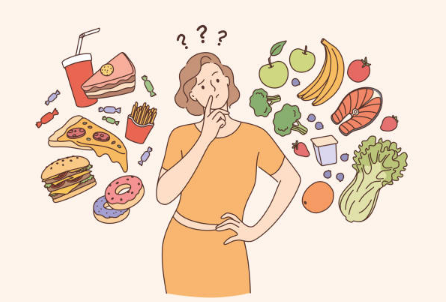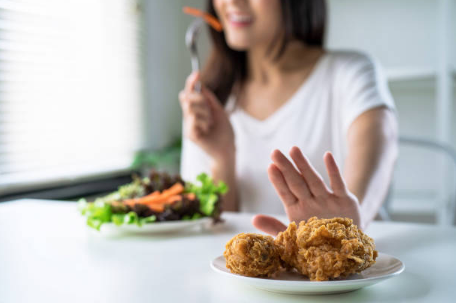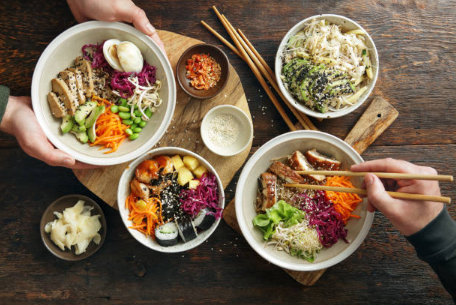Junk food is a term commonly used to describe ultra-processed foods and beverages, such as fast food, soda, candy, cookies, and savory snacks. These foods make up a large part of most people’s diets. In fact, some research findings suggest that junk food accounts for nearly 50% of the average daily calorie intake of Americans.
While there’s nothing wrong with enjoying your favorite foods (such as baked goods, ice cream, and chips) from time to time, junk food shouldn’t be a regular part of your diet because regular consumption of junk food can harm your physical and mental health.

For example, diets rich in junk food have been linked to diseases such as obesity, fatty liver, high blood sugar, depression, heart disease, and certain cancers.
If your current diet is high in junk food and you’re struggling to kick the junk food habit, there are a few things you can try.
Here are 9 evidence-based recommendations that can help you eat less junk food.
1. Cook More at Home
Making an effort to cook more at home is one of the best ways to reduce junk food. Typically, when people don’t have other meal or snack options on the go, they opt for convenience foods such as sweetened coffee drinks, donuts, and fast food.
Cooking more at home, including preparing meals, can help you reduce your reliance on convenience foods and ensure that you always have a healthy meal or snack on hand. Several studies have found that people who cook regularly have a higher quality diet, including a higher intake of fruits and vegetables, a lower intake of fast food, and lower rates of obesity, compared to those who eat out regularly. Plus, they tend to spend less money on food.
If you’re not used to cooking at home, start slowly, prepare one or two meals a week at home, and then increase the amount of meals you prepare at home.
2. Eat More Protein
Protein is the most filling nutrient and has a big impact on your food intake and food choices. Studies have shown that increasing protein intake is an effective way to reduce snacking and prevent overeating, which may help reduce junk food intake.
Some studies have shown that reducing carb intake and replacing carbs with fat and protein sources can help reduce food cravings as well as overall calorie intake. A small 2019 study of 19 people found that sticking to a high-protein, low-carb diet (containing 14% carbohydrates, 58% fat, and 28% protein) for four weeks significantly reduced food cravings, including sweet and fast food cravings.
Researchers have also found that following this diet can help improve dietary restraint while reducing hunger and disinhibition, which refers to losing control while eating and being prone to overeating when very tasty foods such as junk food are present.

3. Replenish Your Body Regularly
Reducing your body’s caloric intake or excessively restricting your food intake may seem like an effective way to promote weight loss or prevent junk food intake, but it can actually have the opposite effect.
Although the relationship between the effects of caloric restriction on appetite and caloric intake is complex, some research suggests that skipping meals and depriving the body of certain foods may increase appetite and snacking.
For example, a 2020 review found that interventions that included avoiding certain foods altogether increased cravings for fasting foods. Additionally, some research suggests that skipping breakfast, such as breakfast, may increase cravings for carbohydrate-rich foods in the evening.
While everyone has different calorie and mealtime needs, overall, following a meal plan that consists of regular, nutritious, protein-dense meals and snacks can help you maintain a healthy calorie intake and reduce junk food cravings.
4. Eat Plenty of Foods That Make You Feel Full
If you’re having trouble with your diet and food choices, learning more about how certain foods affect your body and hunger levels may help you develop a healthier eating plan and reduce your junk food intake.
Most junk foods are high in calories but low in satiety nutrients, such as fiber, protein, and healthy fats. Protein and fiber are especially important for feeling full, as they help your body feel full after eating.
Instead of eating junk food like donuts and sugary coffee on your way to work, take a moment to think about what your body needs and how this meal will affect your blood sugar, hunger levels, and mood. Choosing a high-protein, high-fiber breakfast, such as eggs, fruit, and unsweetened coffee, will help you feel fuller after a meal, which may help prevent junk food cravings later in the day.
5. Get Enough Sleep
Sleep is essential for health, and depriving your body of quality sleep can negatively impact your food choices and increase your junk food cravings.
Studies have shown that sleep deprivation and disrupted sleep patterns can increase overall calorie intake, snacking, and cravings for high-carbohydrate and fatty foods, such as junk food.

Unfortunately, just one night of poor sleep can affect your food choices the next day. A 2019 study of 24 women found that when they spent 33% less time in bed (i.e., two to three hours less sleeping), women experienced hunger and increased food cravings compared to normal nighttime sleep. Decreased sleep has also been linked to an increased demand for chocolate and larger portions.
To promote and protect overall health, the National Sleep Foundation recommends that adults get seven to nine hours of sleep per night.
6. Manage Your Stress
Stress can have a significant impact on your physical and mental health and can even affect your food choices. While it’s impossible to avoid all forms of stress, developing healthy stress management practices can help you reduce your junk food intake.
Chronic stress has been shown to affect hormones that regulate eating behaviors and food choices, such as cortisol.
Interestingly, during acute or short-term stress, your appetite is often suppressed. However, studies have shown that chronic stress often increases cravings and intake of delicious foods, such as junk food.
A 2021 study that included data from 1,270 adults found that participants with higher levels of perceived stress reported higher rates of ultra-processed food consumption. Studies have shown that people with high stress levels are almost twice as likely to consume ultra-processed foods as those with high stress levels compared to those with low stress levels.
Meditation, exercise, therapy, and spending more time outdoors are just a few examples of evidence-based approaches to stress reduction.
7. Consider Overhauling Your Pantry
If your kitchen is cluttered with junk food, you may want to consider swapping out ultra-processed products for more nutritious options. Storing very tasty, easy-to-overeat junk food in the kitchen can lead to excessive snacking and calorie intake, which can negatively affect health in several ways.
Studies have shown that even looking at tempting foods stimulates an area of the brain called the striatum, which is responsible for regulating appetite and rewards for food intake. This means that even if you don’t have to be hungry, seeing very tasty foods such as candy, chips, and cookies in line of sight can lead to snacking and overeating.
While there’s nothing wrong with eating sweet or salty foods once in a while, if you’re looking to reduce your junk food intake, it’s best to avoid buying junk food and instead stocking your kitchen with nutritious products. For example, instead of putting candy on the counter, try stocking up on fresh fruit as a naturally sweetened snack.

8. Don’t Start a Restrictive Diet
Following an unnecessarily restrictive diet is not good for your overall health and can also negatively impact your relationship with food. Excessively restrictive diets can lead to a harmful cycle of weight loss and rebound, often referred to as yo-yo dieting. Over time, yo-yo dieting can not only lead to weight gain, but also an increased risk of health conditions such as diabetes, high blood pressure, and metabolic syndrome.
What’s more, most fad diets have strict restrictions and involve strict rules, such as avoiding added sugars altogether or significantly reducing carbs. Strict avoidance of specific foods and designating certain foods as “fasting” may increase cravings for those foods, leading to overeating and an unhealthy relationship with food.
Whether you’re looking to lose excess pounds or just want to clean up your diet, there’s usually no need to follow a very strict eating pattern. Instead of trying the latest fad diets, try to shift to a more nutritious, well-rounded eating pattern that is associated with positive health outcomes, such as the Mediterranean-style diet or a plant-focused diet. These dietary patterns do not involve strict food rules, but rather prioritize foods known to enhance satiety and reduce appetite, such as protein-rich beans and seafood, as well as fiber-rich vegetables.
9. Go Grocery Shopping Regularly
Having a well-stocked kitchen can make it easier for you to prepare more meals at home and can help you eat less junk food.
Studies have shown that people who frequent grocery shopping have a better quality diet, including a lower intake of ultra-processed foods, than those who don’t.
If you’re having trouble staying on track while shopping at the grocery store, or simply don’t know what to buy, consider making a grocery list. Creating a shopping list will not only help you avoid impulse purchases, such as junk food, but it will also help you build healthier overall eating habits. A comprehensive shopping list should include a variety of nutritious foods, such as fresh and frozen fruits and vegetables, nuts and seeds, canned and dried beans, and protein options such as poultry, fish, or tofu.
Having healthy groceries on hand can motivate you to prepare healthy meals and snacks for the week ahead, which can help you reduce your junk food intake.